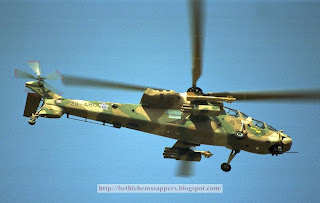This is a brief decription of one of the most famous Sapper accounts in the history of the Angolan bush war.
The the famous battle at Bridge 14 on December 9, 1975, during Operation Savannah. This is the accounts of some really brave Sappers and other forces, that against the odds rebuilt a destroyed bridge over a fast flowing river in Angola. As Sappers' from Bethlehem, the Bridge 14 rebuild was an extra-ordinary feat as it was rebuilt from wood poles and sand bags that had to be cut down from Gum trees and the filled sand bags had also to be brought in.
As engineers, this group had been trained in locating and lifting mines, and in building bridges. From Bethlehem they were off to SWA for border duty.
During Op Savannah in 1975, the troops arrived at the little town of Bibo, Angola - a street, a bank, a hotel and a cigar shop. It was a ghost town, no people, like the Marie Celeste there was warm coffee still in coffee cups. At 17.00 each day the choppers dropped rations - canned peas and Rooibos tea.
Quibela was now an important objective. It was the first week of December and down came the rain. The Nhia river became a real obstacle. The north bank end of the bridge - Bridge 14 - had been blown up by SWAPO. It was up to the Sappers to 'fix' it. This was done by building up alternative layers of sand bags and blue gum logs which had to be cut down. (Note a beautiful picture of Bridge 14, taken from the enemy side, showing the repairs)
As they worked, the Sappers came under small arms fire and Red Eye (Katyusha) rockets. "The loud explosions of the rockets for two days wore the troops down. Troops could die (and some did). But then the Bats arrived, crossed over, and there was no more enemy fire after that. There were some acts of great heroism at the Bridge. A Lieutenant swam the river three times to get medical supplies for his wounded men on the north side.
The Elands (armoured cars) arrived, the Battle group crossed over the bridge and laid into the enemy. The repairs to Bridge 14 had paid off, but four of our men died. The troops were then ordered to withdraw and return to base, a decision already made in Pretoria, (a decision that upset many of the troops).
They were heroes all.......
FAIR USE NOTICE: This website may contain copyrighted material the use of which has not been pre-authorized by the copyright owner. Such material is made available to advance understanding of political, economic, scientific, social, art, media, and cultural issues. Material on this site is distributed without profit to persons interested in such information for research and educational purposes. If you want to use any copyrighted material that may exist on this site for purposes that go beyond 'fair use', you must obtain permission from the copyright owner.


















































































